Scopes Trial
- 格式:ppt
- 大小:1.35 MB
- 文档页数:19
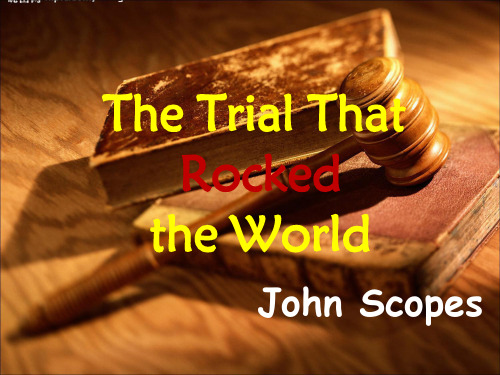
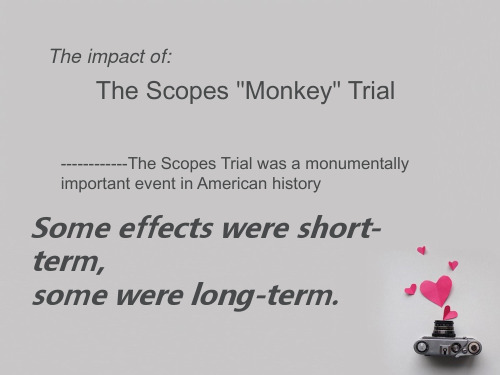
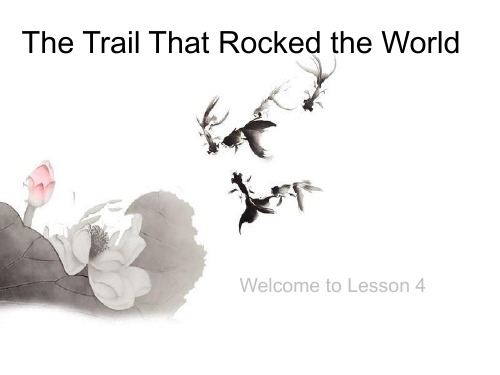
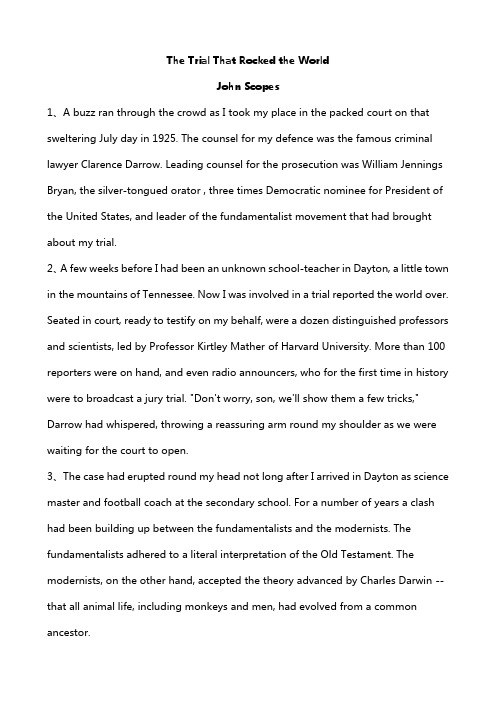
The Trial That Rocked the WorldJohn Scopes1、A buzz ran through the crowd as I took my place in the packed court on that sweltering July day in 1925. The counsel for my defence was the famous criminal lawyer Clarence Darrow. Leading counsel for the prosecution was William Jennings Bryan, the silver-tongued orator , three times Democratic nominee for President of the United States, and leader of the fundamentalist movement that had brought about my trial.2、A few weeks before I had been an unknown school-teacher in Dayton, a little town in the mountains of Tennessee. Now I was involved in a trial reported the world over. Seated in court, ready to testify on my behalf, were a dozen distinguished professors and scientists, led by Professor Kirtley Mather of Harvard University. More than 100 reporters were on hand, and even radio announcers, who for the first time in history were to broadcast a jury trial. "Don't worry, son, we'll show them a few tricks," Darrow had whispered, throwing a reassuring arm round my shoulder as we were waiting for the court to open.3、The case had erupted round my head not long after I arrived in Dayton as science master and football coach at the secondary school. For a number of years a clash had been building up between the fundamentalists and the modernists. The fundamentalists adhered to a literal interpretation of the Old Testament. The modernists, on the other hand, accepted the theory advanced by Charles Darwin -- that all animal life, including monkeys and men, had evolved from a common ancestor.4、Fundamentalism was strong in Tennessee, and the state legislature had recently passed a law prohibiting the teaching of "any theory that denies the story of creation as taught in the Bible." The new law was aimed squarely at Darwin's theory of evolution. An engineer, George Rappelyea, used to argue with the local people against the law. During one such argument, Rappelyea said that nobody could teach biology without teaching evolution. Since I had been teaching biology, I was sent for.5、"Rappelyea is right," I told them.6、"Then you have been violating the law," one of them Said.7、"So has every other teacher," I replied. "Evolution is explained in Hunter's Civic Biology, and that's our textbook."8、Rappelyea then made a suggestion. "Let's take this thing to court," he said, "and test the legalityof it."9、When I was indicted on May 7, no one, least of all I, anticipated that my case would snowball into one of the most famous trials in U. S. history. The American Civil Liberties Union announced that it would take my case to the U. S Supreme Court if necessary to “establish that a teacher may tell the truth without being sent to jail." Then Bryan volunteered to assist the state in prosecuting me. Immediately the renownedlawyer Clarence Darrow offered his services to defend me. Ironically, I had not known Darrow before my trial but I had met Bryan when he had given a talk at my university. I admired him, although I did not agree with his views.10、By the time the trial began on July 10, our town of 1,500 people had taken on a circusatmosphere. The buildings along the main street were festoonedwith banners. The streets around the three-storey red brick law court sproutedwith rickety standsselling hot dogs, religious books and watermelons. Evangelists set up tents to exhortthe passersby. People from the surrounding hills, mostly fundamentalists, arrived to cheer Bryan against the " infidel outsiders." Among them was John Butler, who had drawn up the anti-evolution law. Butler was a 49-year-old farmer who before his election had never been out of his native county.11、The presiding judge was John Raulston, a florid-faced man who announced: "I'm just a reg’lar mountaineer jedge." Bryan, ageing and paunchy , was assisted in his prosecution by his son, also a lawyer, and Tennessee's brilliant youngattorney-general, Tom Stewart. Besides the shrewd 68-year-old Darrow, my counsel included the handsome and magnetic Dudley Field Malone, 43, and Arthur Garfield Hays, quiet, scholarly and steeped in the law. In a trial in which religion played a key role, Darrow was an agnostic, Malone a Catholic and Hays a Jew. My father had come from Kentucky to be with me for the trial.12、The judge called for a local minister to open the session with prayer, and the trial got under way. Of the 12 jurors, three had never read any book except the Bible. One couldn't read. As my father growled, "That's one hell of a jury!"13、After the preliminary sparring over legalities, Darrow got up to make his opening statement. "My friend the attorney-general says that John Scopes knows what he is here for," Darrow drawled. "I know what he is here for, too. He is here because ignorance and bigotryare rampant, and it is a mighty strong combination."14、Darrow walked slowly round the baking court. "Today it is the teachers, "he continued, "and tomorrow the magazines, the books, the newspapers. After a while, it is the setting of man against man and creed against creed until we are marchingbackwards to the glorious age of the sixteenth century when bigots lighted faggots to burn the men who dared to bring any intelligence and enlightenment and Culture to the human mind. "15、"That damned infidel," a woman whispered loudly as he finished his address.16、The following day the prosecution began calling witnesses against me. Two of my pupils testified, grinning shyly at me, that I had taught them evolution, but added that they had not been contaminated by the experience. Howard Morgan, a bright lad of 14, testified that I had taught that man was a mammal like cows, horses, dogs and cats.17、"He didn't say a cat was the same as a man?" Darrow asked.18、"No, sir," the youngster said. "He said man had reasoning power."19、"There is some doubt about that," Darrow snorted.20、After the evidence was completed, Bryan rose to address the jury. The issue was simple, he declared "The Christian believes that man came from above. The evolutionist believes that he must have come from below." The spectators chuckled and Bryan warmed to his work. In one hand he brandished a biology text as he denounced the scientists who had come to Dayton to testify for the defence. 21、"The Bible," he thundered in his sonorous organ tones, " is not going to be driven out of this court by experts who come hundreds of miles to testify that they can reconcile evolution, with its ancestors in the jungle, with man made by God in His image and put here for His purpose as par t of a divine plan."22、As he finished, jaw out-thrust, eyes flashing, the audience burst into applauseand shouts of "Amen". Yet something was lacking. Gone was the fierce fervor of the dayswhen Bryan had swept the political arena like a prairie fire. The crowd seemed to feel that their champion had not scorched the infidels with the hot breath of his oratory as he should have.23、Dudley Field Malone popped up to reply. "Mr. Bryan is not the only one who has the right to speak for the Bible,”he observed. "There are other people in this country who have given up their whole lives to God and religion. Mr. Bryan, with passionate spirit and enthusiasm, has given most of his life to politics." Bryan sipped from a jug of water as Malone's voice grew in volume. He appealed for intellectual freedom, and accused Bryan of calling for a duel to the death between science and religion.24、"There is never a duel with the truth," he roared. "The truth always wins -- and we are not afraid of it. The truth does not need Mr. Bryan. The truth is eternal, immortal and needs no human agency to support it! "25、When Malone finished there was a momentary hush. Then the court broke into a storm of applause that surpassed that for Bryan. But although Malone had won the oratorical duel with Bryan, the judge ruled against permitting the scientists to testify for the defence.26、When the court adjourned, we found Dayton's streets swarming with strangers. Hawkerscried their wares on every corner. One shop announced: DARWIN IS RIGHT –INSIDE. (This was J. R. Darwin's Everything to Wear Store.) One entrepreneur rented a shop window to display an ape. Spectators paid to gaze at it and ponderwhether they might be related.27、"The poor brute cowered in a corner with his hands over his eyes, ”a reporter noted, "afraid it might be true. "28、H. L. Mencken wrote sulphurous dispatches sitting in his pants with a fan blowing on him, and there was talk of running him out of town for referring to the local citizenry as yokels . Twenty-two telegraphists were sending out 165,000 words a day on the trial.29、Because of the heat and a fear that the old court's floor might collapse, under the weight of the throng, the trial was resumed outside under the maples. More than 2,000 spectators sat on wooden benches or squattedon the grass, perched on the tops of parked cars or gawked from windows.30、Then came the climax of the trial. Because of the wording of the anti-evolution law, the prosecution was forced to take the position that the Bible must be interpreted literally. Now Darrow sprang his trump card by calling Bryan as a witness for the defence. The judge looked startled. "We are calling him as an expert on the Bible," Darrow said. "His reputation as an authority on Scripture is recognized throughout the world."31、Bryan was suspicious of the wily Darrow, yet he could not refuse the challenge. For years he had lectured and written on the Bible. He had campaigned against Darwinism in Tennessee even before passage of the anti-evolution law. Resolutely he strode to the stand, carrying a palm fan like a sword to repel his enemies.32、Under Darrow's quiet questioning he acknowledged believing the Bible literally, and the crowd punctuated his defiant replies with fervent "Amens".33、Darrow read from Genesis: "And the evening and the morning were the first day." Then he asked Bryan if he believed that the sun was created on the fourth day. Bryan said that he did.34、"How could there have been a morning and evening without any sun?" Darrow enquired.35、Bryan mopped his bald dome in silence. There were sniggers from the crowd, even among the faithful. Darrow twirled his spectacles as he pursued the questioning. He asked if Bryan believed literally in the story of Eve. Bryan answered in the affirmative.36、"And you believe that God punished the serpent by condemning snakes for ever after to crawl upon their bellies?"37、"I believe that."38、"Well, have you any idea how the snake went before that time?"39、The crowd laughed, and Bryan turned livid. His voice rose and the fan in his hand shook in anger.40、"Your honor," he said. "I will answer all Mr. Darrow's questions at once. I want the world to know that this man who does not believe in God is using a Tennessee court to cast slurs on Him..."41、"I object to that statement,”Darrow shouted. “I am examining you on your fool ideas that no intelligent Christian on earth believes."42、The judge used his gavel to quell the hubbuband adjourned court until next day.43、Bryan stood forlornly alone. My heart went out to the old warrior as spectators pushed by him to shake Darrow's hand.44、The jury were asked to consider their verdict at noon the following day. The jurymen retired to a corner of the lawn and whispered for just nine minutes. The verdict was guilty. I was fined 100 dollars and costs.45、Dudley Field Malone called my conviction a "victorious defeat." A few southern papers, loyal to their faded champion, hailed it as a victory for Bryan. But Bryan, sad and exhausted, died in Dayton two days after the trial.46、I was offered my teaching job back but I declined. Some of the professors who had come to testify on my behalf arranged a scholarship for me at the University of Chicago so that I could pursue the study of science. Later I became a geologist for an oil company.47、Not long ago I went back to Dayton for the first time since my trial 37 years ago. The little town looked much the same to me. But now there is a William Jennings Bryan University on a hill-top over looking the valley.48、There were other changes, too. Evolution is taught in Tennessee, though the law under which I was convicted is still on the books. The oratorical storm that Clarence Darrow and Dudley Field Malone blew up in the little court in Dayton swept like a fresh wind through the schools and legislative offices of the United States, bringing in its wake a new climate of intellectual and academic freedom that has grown with the passing years.(from Reader's Digest, July, 1962)。
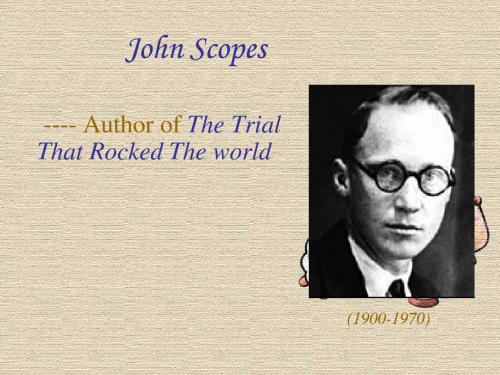

Timeline: Remembering the Scopes Monkey TrialAll Things Considered, July 5, 2005 · Eighty years ago, in July 1925, the mixture of religion, science and the public schools caught fire in Dayton, Tenn. The Scopes trial -- or "Monkey Trial," as it was called -- dominated headlines across the country. The trial lasted just a week, but the questions it raised are as divisive now as they were back then. NPR looks back at the Scopes trial, the events that led up to it and its aftermath:1859 –Charles Darwin's The Origin of Species is published. Darwin argues in his introduction that "the view which most naturalists entertain, and which I formerly entertained -- namely, that each species has been independently created -- is erroneous."1871 – Darwin publishes his second book, The Descent of Man. In this work, Darwin directly addresses the debate over the origin of mankind, arguing that "man is descended from a hairy, tailed quadruped, probably arboreal in its habits, and an inhabitant of the Old World."1914 –George William Hunter's A Civic Biology, the book that is later used in biology courses in Dayton, Tenn., is published. A Civic Biology describes evolution as "the belief that simple forms of life on the earth slowly and gradually gave rise to those more complex and that thus ultimately the most complex forms came into existence."1921 –Former congressman and ex-Secretary of State William Jennings Bryan becomes a leader in the anti-evolution movement, delivering speeches entitled "The Menace of Darwinism" and "The Bible and its Enemies." Bryan declares in one address that "[i]t is better to trust in the Rock of Ages, than to know the age of the rocks; it is better for one to know that he is close to the Heavenly Father, than to know how far the stars in the heavens are apart." 1924 – Bryan delivers a lecture in Nashville entitled "Is the Bible true?" Copies of the speech are delivered to members of the Tennessee legislature, including Rep. John Washington Butler.Jan. 21, 1925 – Rep. Butler introduces legislation in the Tennessee House of Representatives calling for a ban on the teaching of evolution. The proposed law, known as the Butler bill, would prohibit the teaching of "any theory that denies the story of the Divine Creation of man as taught in the Bible, and to teach instead that man has descended from a lower order of animals."Jan. 27, 1925 – The Tennessee House of Representatives approves the Butler bill on a 71-to-5 vote.March 13, 1925 – After several hours of heated debate, the Tennessee Senate approves the Butler bill 24 to 6.March 21, 1925 – Tennessee Gov. Austin Peay signs the Butler bill into law. The new law is the first in the United States to ban the teaching of evolution.May 4, 1925 –A Chattanooga newspaper runs an item noting that the American Civil Liberties Union is seeking teachers willing to challenge the Butler law. The item says that theACLU is "looking for a Tennessee teacher who is willing to accept our services in testing this law in the courts. Our lawyers think a friendly test case can be arranged without costing a teacher his or her job... All we need now is a willing client."May 5, 1925 –A group of town leaders in Dayton, Tenn., read the news item about the ACLU's search. They quickly hatch a plan to bring the case to Dayton, a scheme that they hope will generate publicity and jump-start the town's economy. They ask 24-year-old science teacher and football coach John Thomas Scopes if he'd be willing to be indicted to bring the case to trial. Scopes agrees, even though he has only taught biology as a substitute teacher and later says he isn't sure he covered evolution in his classes.May 12, 1925 – Bryan agrees to participate in the trial on the side of the prosecution, ensuring that the case will receive significant national interest. Several days later, well-known attorneys Clarence Darrow and Dudley Field Malone announce their interest in representing Scopes.May 25, 1925 – Scopes is indicted by a grand jury for violating Tennessee's anti-evolution law.May-July, 1925 –Preparations begin in Dayton for an expected onslaught of trial-related publicity. Six blocks of Dayton's main road are transformed into a pedestrian mall; a speaker's platform is built on the lawn of the courthouse; and a tourist camp is constructed. The courtroom is outfitted with the latest technology to transmit the story to the world: telegraph and telephone wiring, movie-newsreel camera platforms and radio microphones. WGN Radio broadcasts the trial live at a cost of more than $1,000 a day just for telephone lines -- the first such broadcast of its kind.July 10, 1925 –The trial begins with jury selection. Judge John Raulston asks the Rev. Lemuel M. Cartright to open the proceedings with a prayer.July 13, 1925 – In an effort to have the Butler law declared unconstitutional, defense attorney Clarence Darrow delivers a long, fiery speech arguing that the law violates freedom of religion. Darrow argues that "we find today as brazen and as bold an attempt to destroy learning as was ever made in the Middle Ages."July 14, 1925 – In the third day of the trial, Darrow objects to the practice of opening the trial with a prayer. Judge Raulston overrules the objection, noting that he has instructed the ministers who offer the prayer to "make no reference to the issues involved in this case."July 15, 1925 – Judge Raulston overrules the defense's motion to have the Butler law declared unconstitutional. Raulston says in his ruling that the law "gives no preference to any particular religion or mode of worship. Our public schools are not maintained as places of worship, but, on the contrary, were designed, instituted, and are maintained for the purpose of mental and moral development and discipline."In an afternoon session that day, a not guilty plea is entered on Scopes' behalf. Each sidepresents its opening statements. The prosecution questions the superintendent of schools and two of Scopes' students, who testify that Scopes taught his class about evolution. The defense questions zoologist Maynard Metcalf, who testifies that evolution is a widely embraced theory in the scientific community.July 17, 1925 –Judge Raulston rules in favor of a motion by prosecutors to bar expert testimony by scientists. Raulston argues that the experts' opinions on evolutionary theory would "shed no light" on the issue at hand in the trial -- whether Scopes violated the state's anti-evolution laws. Many reporters leave town, believing that the trial is effectively over. Scopes is recruited to write news stories on the trial for some of the delinquent journalists. July 20, 1925 – With the proceedings taking place outdoors due to the heat, the defense -- in a highly unusual move -- calls Bryan to testify as a biblical expert. Clarence Darrow asks Bryan a series of questions about whether the Bible should be interpreted literally. As the questioning continues, Bryan accuses Darrow of making a "slur at the Bible," while Darrow mocks Bryan for "fool ideas that no intelligent Christian on earth believes."July 21, 1925 – The final day of the trial opens with Judge Raulston's ruling that Bryan cannot return to the stand and that his testimony should be expunged from the record. Raulston declares that Bryan's testimony "can shed no light upon any issues that will be pending before the higher courts." Darrow then asks the court to bring in the jury and find Scopes guilty -- a move that would allow a higher court to consider an appeal. The jury returns its guilty verdict after nine minutes of deliberation. Scopes is fined $100, which both Bryan and the ACLU offer to pay for him.After the verdict is read, John Scopes delivers his only statement of the trial, declaring his intent "to oppose this law in any way I can. Any other action would be in violation of my ideal of academic freedom -- that is, to teach the truth as guaranteed in our constitution, of personal and religious freedom."July 26, 1925 – Five days after the Scopes trial ends, Bryan dies in his sleep in Dayton.July 31, 1925 –Bryan is buried in Arlington National Cemetery. The words "He Kept the Faith" are inscribed on his tombstone.1926 – Mississippi becomes the second state to pass a law banning the teaching of evolution in public schools.May 31, 1926 – The appeal hearing in the Scopes case begins.Jan. 15, 1927 –The Tennessee Supreme Court rules that the Butler law is constitutional. However, it overturns Scopes' verdict on a technicality, ruling that his fine should have been set by the jury hearing the case instead of by Judge Raulston. The justices declare in their ruling that "[n]othing is to be gained by prolonging the life of this bizarre case."1927 –George William Hunter publishes A New Civic Biology, an updated version of the biology book used in the Dayton high school where Scopes taught. The new text deals withthe concept of evolution cautiously and avoids explicitly naming the theory.1928 – A third state, Arkansas, enacts legislation banning instruction on evolution.1930 –The William Jennings Bryan Memorial University opens in Dayton, Tenn. Known today as Bryan College, the institution describes itself as "a highly ranked, nationally competitive college that puts Christ above all."March 13, 1938 – Clarence Darrow dies at the age of 80.Jan. 10, 1955 – The play Inherit the Wind, which is loosely based on the Scopes trial, opens on Broadway.1960 – Thirty-five years after the Scopes trial, the film version of Inherit the Wind opens at a drive-in movie theater in Dayton. Scopes returns to the town for the premiere and is given the key to the city.May 17, 1967 –Tennessee repeals the Butler Act, the law that banned the teaching of evolution in public schools.1967 – John Scopes publishes Center of the Storm, his memoir of the trial.1968 – In Epperson v. Arkansas, the Supreme Court strikes down an Arkansas law banning the teaching of evolution.Oct. 21, 1970 – John Scopes dies at the age of 70.1973 –Tennessee becomes the first state in the United States to pass a law requiring that public schools give equal emphasis to "the Genesis account in the Bible" along with other theories about the origins of man. The bill also requires a disclaimer be used any time evolution is presented or discussed in public schools. It demands evolution be taught as theory and not fact.1975 – Two years after it is passed, Tennessee's "equal time" law is declared unconstitutional by a federal appeals court.1977 – The National Park Service designates Rhea County Courthouse in Dayton a National Historic Landmark.1982 -- In McLean v. Arkansas Board of Education, a U.S. district judge strikes down an Arkansas law that required public schools to give "balanced treatment" to evolution and creationism whenever either was taught.1987 –In Edwards v. Aguillard, the Supreme Court rules that a Louisiana law requiring public schools to give "balanced treatment" to creationism and evolution is unconstitutional. 2005 –School boards and legislatures across the country are continuing to debate how to teach students about the origins of life on Earth. Policymakers in at least 16 states are currently examining the controversy.。
Lesson1 topic1.Hurricane Katrina2.My experience of an earthquake(or a flood, or a typhoon, or a bad accident, etc)Lesson3 topicDescribe and comment on one of the three characters in the text.Write an essay titled Reflections on “Blackmail” with300 words in English.You can approach the essay from the following perspectives.•The characterization of the three characters.•The preparation for the climax of the story.•The morality or immorality of the Duchess.Lesson41.William Jennings Bryan and the fundamentalist movement in the 1920s2.the effects of the Scopes ”Monkey Trial”Lesson61.Mark Twain’s life2.My favorite book by Mark Twain3.The Adventure of Huckleberry Finn(or Tom Sawyer)Lesson71.Alice Walker and her workpare the two sisters Dee and Maggiement on the character of Mrs.Johnson•Vocabulary Test•Lesson 1 book 11.The crew had been mustered to______the hatches.a. batten down 板条钉住b. sit outc. come byd. trail away•The crew had been mustered to batten down the hatches.•所有船员被集合起来进行封舱以防暴风雨袭击.2. If clouds______along, they move quickly and smoothly through the sky.Scramble爬 b. clutch抓住 c. scud疾行 d. perish死亡•If clouds scud along, they move quickly and smoothly through the sky.•(云彩)掠过3. He received a_______of her hand on his cheek.a. swathb. lash 抽打c. slashd. pitch•He received a lash of her hand on his cheek.•他突然被她打了一记耳光.4. The thief was pushed and________ by an angry crowd.a.raged 动怒b. lapped包围c. cowered畏缩d. pummeled击打The thief was pushed and pummeled by an angry crowd.一群人推搡并痛打小偷。
Good morning, ladies and gentimen .Thank you very much for your participation in this presentation .Today’s presentation mainly deal with our text book ,lessonten__The trial that rocked the world .First, let us have a look at the author John Scopes.This article is written by John Thomas Scopes (August 3, 1900 – October 21, 1970).John Scopes (1900~1970) came to Tennessee fresh out of college. In the spring of 1925, he had just completed his first year as science teacher and part-time football coach at the high school in the little town of Dayton. In that year of 1925, he violated a state law by teaching the theory of evolution in a Tennessee high school. 约翰斯各普斯(1900-1970)1925年24岁的斯各普斯从肯尼亚大学毕业,任田纳西州代顿镇中学的生物老师和橄榄球队教练。
1925年他由于教授达尔文的进化论而受到指控The trial began on July 10, 1925 and ended with Scopes guilty and $100 fine 。
trial中文意思是?秒懂英文「trial」意思!
trial 中文意思是指「试验;试用」的意思,trial 通常当作名词或形容词的形式,形容词中文意思为「试验的」的意思。
下面列举出trial的英文用法、英文例句跟中文意思,赶快学起来吧!
1.trial 试验;试用
trial当成名词的时候,中文意思是指「试验;试用」的意思。
Trial 相关英文单字:
例: clinical trials 临床试验
trial相关英文例句:
例:They’re doing clinical trials on a new drug. 他们正在对一种新药进行临床试验。
例: They will trial the new drug in several hospitals. 他们将在几家医院试用这种新药。
trial, trial 中文, trial 中文意思, trial 中文的意思, trial 中文解释, trial 意思, trial 用法, trial 翻译, 英文 trial。